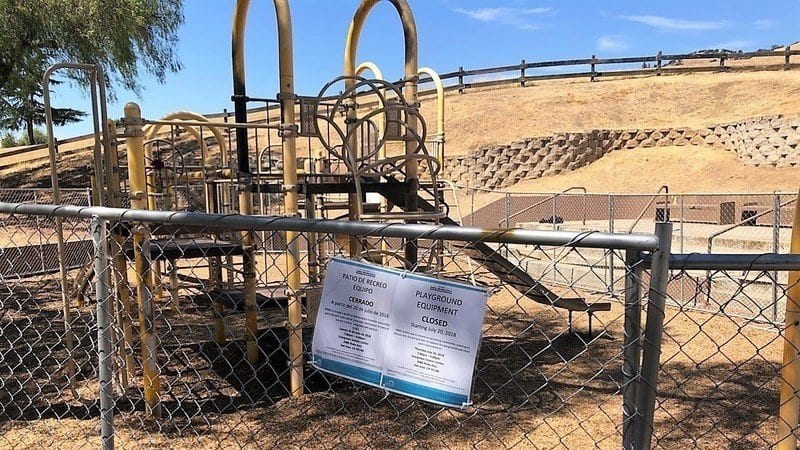San Jose’s parks are crumbling to a tune of roughly $452 million dollars – $40 million more than they were last year.
The perennial issue of the maintenance backlog resurfaced at last week’s City Council meeting. Councilors approved $4.7 million from the sale of a Coleman Avenue property to go back to parks. Funds from the November 2000 bond Measure P were expended on the property as the city had eyed it as the potential site for a youth soccer field.
But with a hefty maintenance backlog and the city exhausting almost all of the $228 million bond earmarked for increasing and improving San Jose’s parks and recreation areas on projects such as reconstructing aging playgrounds and building new recreational sports facilities, there’s little money left to address the wear and tear of existing parks.
“This is where we are at,” said Carolina Camarena, a spokeswoman for the Parks, Recreation and Neighborhood Services Department. “This is the reality of the department. We built out and the recession hit.”
Since the department has no sustainable funding, Camarena said, the city could not adequately address the backlog. City reports show $201 of the $452 million accounts for parks maintenance that includes upkeep like irrigation, pathways and grass. That number is expected to grow over time.
Another $130 million chunk of the backlog deals with buildings on park grounds or the upkeep of community centers. The parks department currently makes up 76 percent of the city’s total building maintenance backlog. The final $121 million roughly accounts for the city’s playgrounds needs.
Camarena said that of the 283 playgrounds in San Jose, 81 percent will exceed its lifetime use in 2020.
Like a home or a car, she added that playgrounds age over time and need maintenance. With money for the upkeep coming out of San Jose’s general fund, and other priorities pressing the city’s purse strings, the backlog stacks up. Restoring the playgrounds that have exceeded lifetime use could cost San Jose $200,000 to $1 million per playground.
“Providing a safe place for families to connect is vital,” Camarena said. “The issue is now we don’t have any funding mechanism to keep up with our aging infrastructure.”
At last week’s City Council meeting, Jeanette Marsala pleaded to councilors to prioritize funding for parks – and specifically playgrounds. Her neighborhood playground at Grosebeck Hill Park reached its maximum use last year and was shut down due to safety issues. Residents of the East Hills Neighborhood Group have since been fighting for funding for a new playground.
“When I told my niece that the playground was going to be torn away and I don’t know when it might come back, she cried,” Marsala said. “We don’t have a playground right now, that used to be something that we go and play an hour each day right before dinner.”
The state of San Jose parks
Each year, the Parks department reviews the city’s 200 parks using a park condition assessment, which ranks each park on a scale of one to five, based on its current state. For 2018, the parks scored a 3.3 on average with Smythe Field and Alviso Park ranking the worst at 1 and 1.9, respectively. According to the report, the city’s parks overall saw no major decline from last year.
Councilmember Sylvia Arenas last week criticized city officials for not allocating the remaining $20 million from the Coleman Avenue sale to the Parks Department. She cited the park condition assessment report and the many city parks that are in dire need of major renovation.
“We were told that the proceeds were going to go toward funding other parks. All of it,” Arenas said during the meeting. “My vote was with the understanding that this money was going to get reinvested in our parks. I feel like we have an opportunity to address our maintenance backlog.”
With Arenas’ lead, the council ultimately decided to ask city officials to prioritize any unfunded parks maintenance backlog in the upcoming budget. Councilors also requested that officials allocate $3 million in other funds to address deferred maintenance in some of the lowest scoring re-use facilities and parks like Meadowfair Community Center, Guadalupe River Park and Groesbeck Hill Park.
In his March budget proposal, Mayor Sam Liccardo said that city officials are exploring ballot measures to help rebuild and restore the city’s parks. Liccardo also proposed allocating Measure T funds – a $650 million bond passed by voters in November for public safety, infrastructure and disaster preparedness — to improve parks.
About $20 million of the bond revenue would go to LED lighting across the city, including parks, and another $12.95 million is proposed for upgrading community centers and parks facilities as they relate to public safety.
Contact Grace Hase at [email protected] or follow @grace_hase on Twitter.



Leave a Reply
You must be logged in to post a comment.